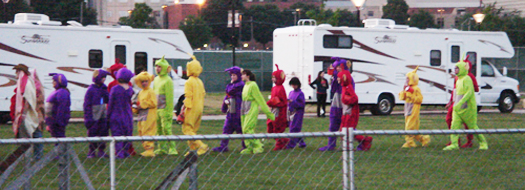
Features | Festivals
80/35 Music Festival
By Andre Perry & Craig Eley | 24 July 2008
:: Addenda by Craig Eley_
:: Photos by Andre Perry, Craig Eley, Todd Olmstead, and Emily Miller
It was Friday night, July 4th, and Wayne Coyne of the Flaming Lips kept trying to get us up, get us excited. “Come on, Des Moines!” he beckoned, “This is the first 80/351! Let’s have some fun.” There were legions of grownups dressed in colorful Teletubby costumes at opposite ends of the stage jumping up and down with glee for the entire Lips set. (Though they weren’t all grownups.) The band was all spectacle, occasionally choosing to play another one of their bombastic hits amidst the endless visual candy and Coyne’s inspirational speeches2. Every song or two he’d shoot out a barrage of confetti and streamers from the stage. Coyne didn’t get it: I didn’t need him to convince me that just because I was in the middle of Iowa I should be surprised about having a good time. In response, I slinked off to the beer tent3 and drank with some of the smaller bands that had played sets earlier that afternoon. They didn’t have hit records or flashy stage set-ups or cartoon personas; a unifying conceit was, simply, an enjoyment of beer.
The Flaming Lips
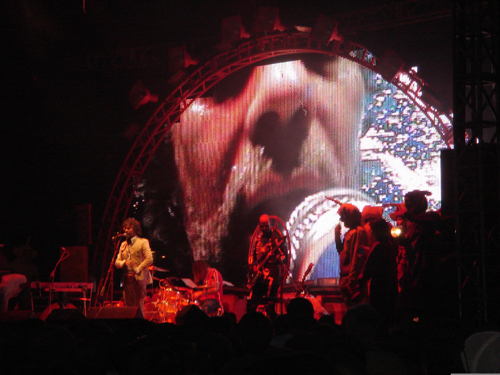
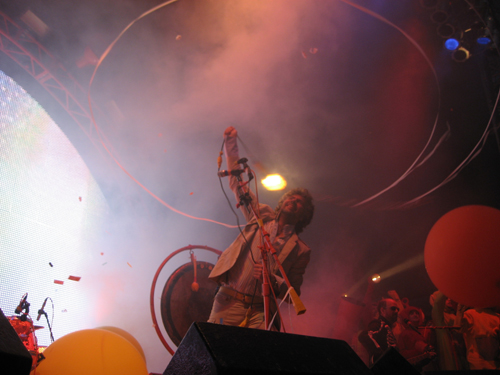
Not to come down too hard on Coyne. He was just doing his job, or so he thought, but he failed to realize that 80/35, Des Moines, Iowa’s newest summer music festival, was managing to have its cake and eat it too. Everyone was happy—the families, the hippies, the hipsters, and the mush in-between—they didn’t need anyone to give them a pep rally. For a first year festival, 80-35 posted several successes—the programming was solid, the outreach to the community was commendable, the layout was both intricate and manageable. Most of all, it really got me thinking about music festivals as a concept, a theoretical/social entity instead of as a series of events and shows and vendors that fall somewhere between legendary and worthless. How are music festivals different from each other and how do they serve different purposes for the community? I’ve been to a few festivals (or musical gatherings4) a number of times. Coachella, SXSW5, and Noisepop (in San Francisco) are my biggest repeat offenders. At those happenings I’ve found myself thinking with the mind of a music critic, which means I was critiquing each of the bands: Radiohead’s set was amazing, Midnight Movies was disappointing, Ponytail6 is my new favorite band, etc…
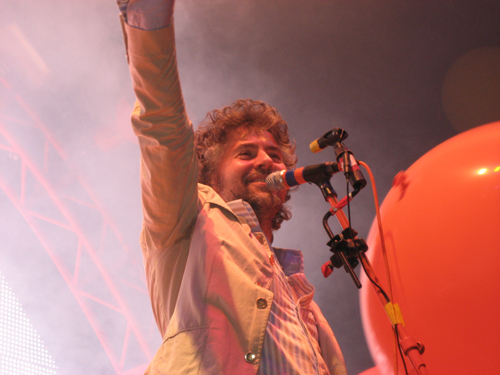
Neva Dinova
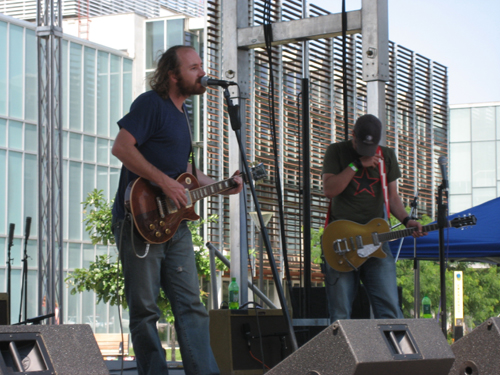
Dave Zollo
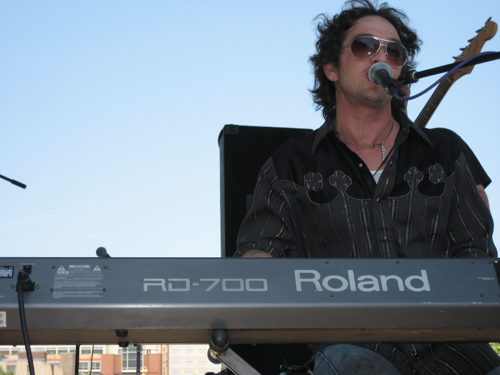
At 80/35, I was looking at the whole picture. Whereas the Pitchfork Music Festival or All Tomorrow’s Parties pretty clearly announce themselves as essential tastemakers in indie and alternative music culture, I think 80/35 is on a bit of a different trip, and a good one at that. The festival organizers, while committed to strong programming, seemed more enthused with the idea of throwing their city an amazing block party7, one that welcomed a wide range of music lovers and got them excited about the possibilities of Des Moines. There were the big names (Flaming Lips, Black Francis, the Roots, Drive-by Truckers) and there were the small ones too (the Poison Control Center, the Envy Corps, Vandon Arms). The goal—and it may well be a common festival goal, I think—seemed to be to attract the common folk with national acts while filling in the gaps with lesser known up-and-comers. And the gaps, for the most part, were filled with some of Iowa’s best instead of a bunch of indies pulled from all over the nation; in short, a strong and obvious commitment to regional artists. In this sense, 80/35 really seems to be celebrating and helping their community. Not just Des Moines, but Iowa at large. Their reach was wide: indie acts like the Poison Control Center and the Envy Corps; roots-rocker Dave Zollo and rare-groovers Diplomats of Solid Sound; jam-friendly Euforquestra and Public Property; the radio metal of Dirty Little Rabbits8, all at the behest of 80/35, a number of different styles from different Iowa regions, from Ames, Iowa City, Des Moines, and beyond, brought sweetly and safely to the unheralded middle of Wayne Coyne’s blind spot.
Dirty Little Rabbits
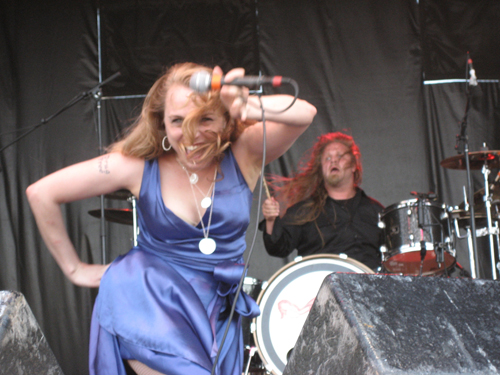
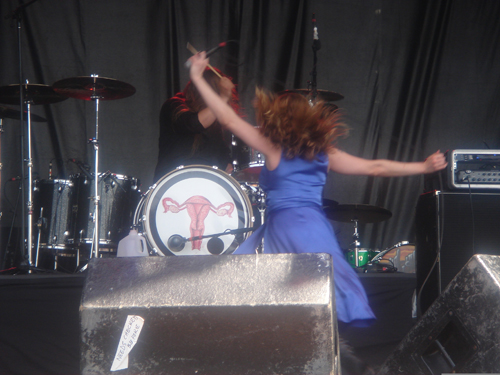
Envy Corps
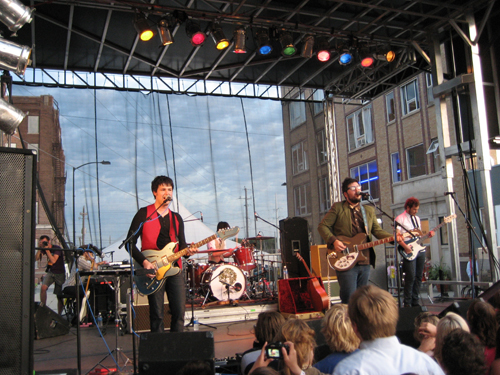
Head festival organizer, Amadeo Rossi, revealed part of the festival’s greater programming plan: “We really booked this along two tracks: there’s an indie track and there’s a jam band track. If you’re an indie fan, you can go from stage to stage and there will always be something. If you’re a jam fan you’ll find the same thing. In the end, the goldmine was the Lips and the Roots, which both indie and jam folks like.” Rossi continued, “You’re seeing twenty local bands and twenty out-of-town bands, some of them national headliners. It’s a unique concept, a mix of big stage and small stage. Some of these small stage bands get to play to bigger crowds than they’re used to and some of these big stage acts get to see a new city.”
The Poison Control Center
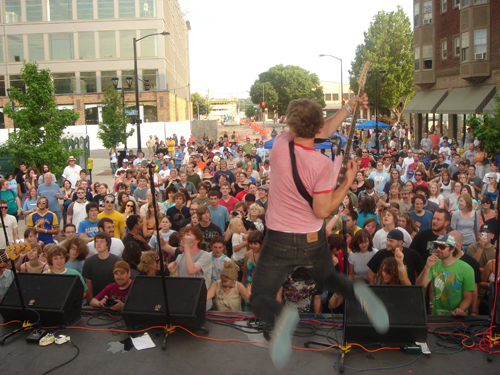
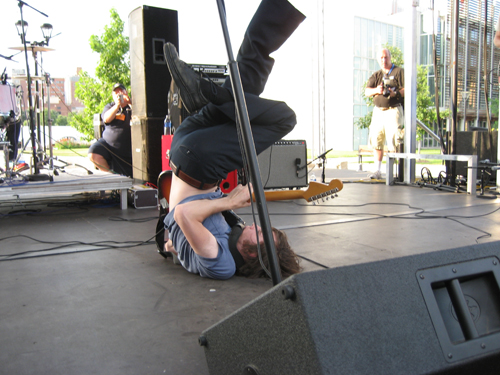
Devin Frank (singer/guitarist in the Poison Control Center) pointed to another intriguing aspect of the festival: “It’s great that it’s so inclusive too. I mean, the fact that [80/35] has free stages9.” Aside from the main stage and the DJ tent, 80/35’s two auxiliary small stages were free. It reminded me a bit of the increasing popularity of day parties at SXSW that allow listeners to see the best new bands without buying a several-hundred-dollar pass. Likewise, Des Moines erected two stages—on side streets at opposite ends of the festival’s center stage—that featured both emerging artists and a handful of well-known veterans. As Devin asserted, “Cracker playing a free stage is awesome.” (And those who stuck around for the duration of Cracker’s set were rewarded with some renditions of Camper Van Beethoven songs like “Take the Skinheads Bowling.”)
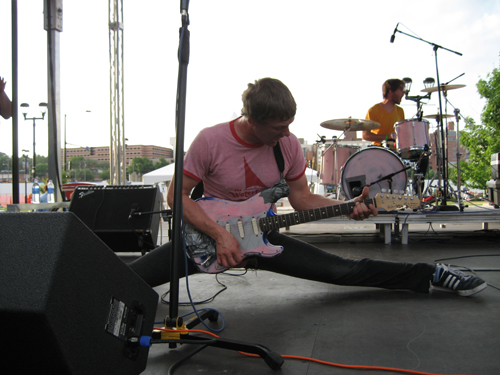
Rock Plaza Central
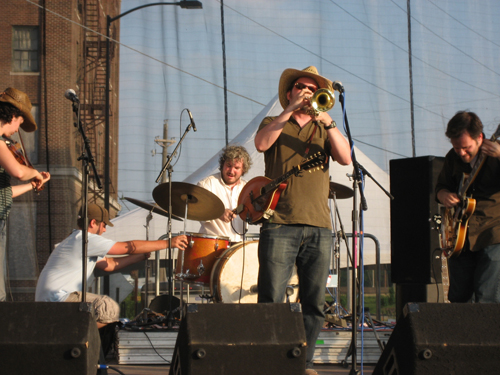

The use of free stages meant a freedom in 80/35 to cover a few idealistic bases. Promoters were confident enough about the talent on their main stage that the big acts would sell tickets to cover festival costs while every member of the Des Moines community could have access to the festival, whether paying customer or not. To take your kid to downtown Des Moines to see Rock Plaza Central on Independence Day is, take it or leave it, a really cool thing. Plus, the festival received considerable backing from the city of Des Moines, emphasizing the potential lifeline a music scene can throw a city or town. While not every resident will be in the clubs every night of the week, there is comfort in knowing that those clubs are booking bands, that the scene is lively and fresh. It goes a long way in making people feel good about their town and staying in their town, knowing that artistic expression is fluid and rampant even in the most unlikely of places. In the end, 80/35 estimates that about 15,000 people were in attendance each day.
Black Francis
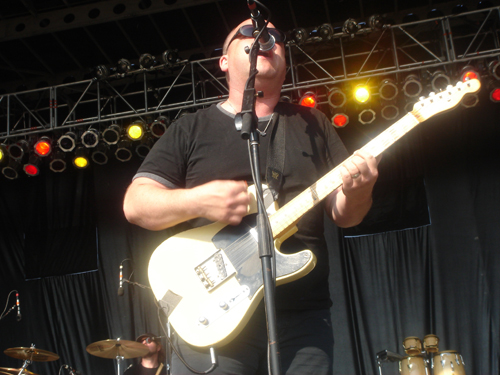
Jakob Dylan

You are not your fucking dad, asshole.
The overall sunny ambiance and good vibes at 80/35, of course, wasn’t enough to completely squelch the snarky music critic inside of me. The Flaming Lips bored me with their apparent inability to write songs that stand alone without the visual mayhem. The Roots started off strong but eventually lost their appeal with over the top jam band excursions. Jakob Dylan was laughable, dressed up like his Rolling Thunder-era dad but playing a bunch of AAA10 schlock. I understand booking the Flaming Lips—a lot of respectable people like them, I just think they suck—but why snag Jakob Dylan to fill your family-safe rock spot when you could probably get Vampire Weekend or Ben Folds at a comparable price? Alternately, Frank Black11 was downright astonishing, abstaining from playing a single Pixies track while still making every song sound like an immediate pop classic. The Drive-By Truckers were pure rock n’ roll, three exploding guitars12, and whiskey-chugging abandon. Rock Plaza Central imbued their energetic acoustic romps with a sense of giddy joy, bringing a taste of that Neutral Milk Hotel sound that never gets old. The Poison Control Center, in the running13 for the best rock band in Iowa, cranked out crushing indie rock riffs, oxymorons mixing elements of Tripping Daisy and every aspect of the Elephant 6 catalog.
The Roots
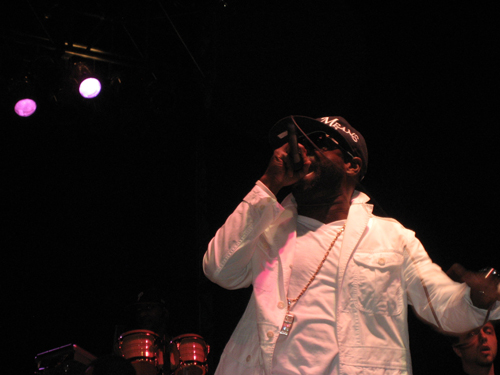
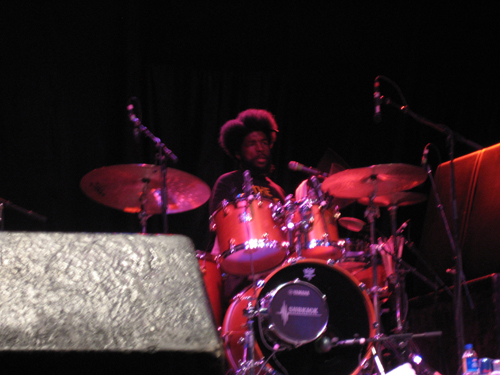
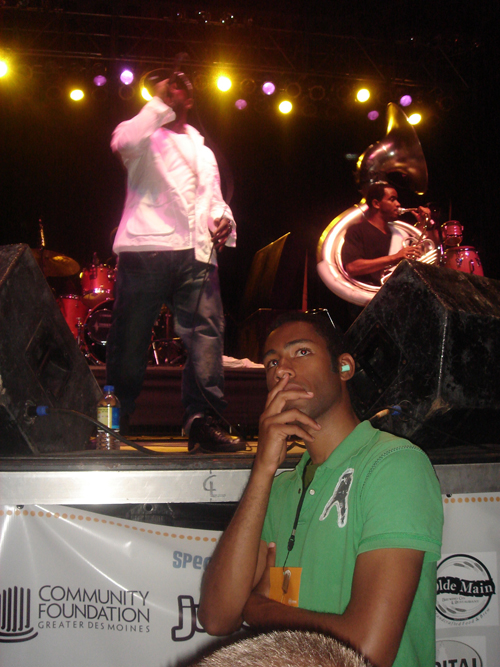
Black Thought with black thought.
Regarding hip-hop: the Roots are mainstays, but it would have been nice to see some still green-around-the-gills hip-hop stars, Midwest products like Invincible, Atmosphere, or Brother Ali. And how about some marginalized music, opportunities at side stages for more out-there bands like Video Hippos, High Places, White Williams, or, forget that, how about representing Iowa’s own experimental scene with bands like Wet Hair and Lwa14.? The variety is there and waiting; maybe next year.
Craig Eley Eating Corn
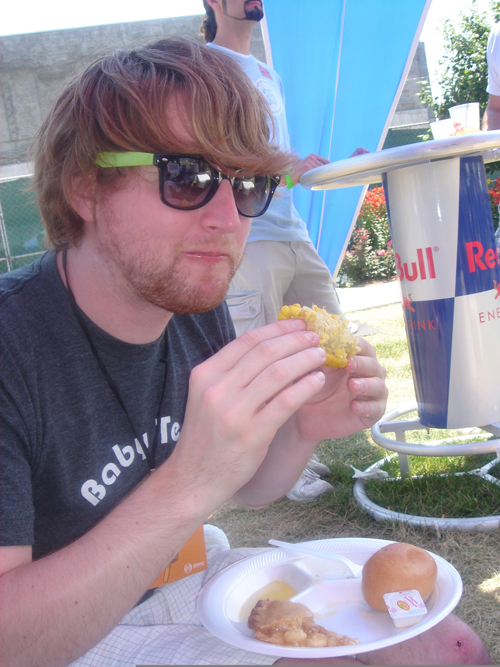
Those sunglasses are almost as gay as the Teletubbies, Craig.
If this chronicle of 80/35 seems rather glowing, well, what can I say? The shit was good15. And it was also important. With folks scampering from all edges of our country to move to the newest metropolitan hot spot, they might forget about potential goldmines lodged in the Midwest. Coastal dwellers roll their eyes at the mention of Iowa, thinking it can’t offer a smidge of culture. Yet as the cost of living gets higher elsewhere life remains affordable and vibrant in places like Des Moines, Omaha, and Kansas City, each of them cities that actually offer artists of all kinds a chance to make art in peace or in peaceful communities and residents of all kinds an accessible, interactive chance to enjoy their culture and neighbors. Jess Huckman of the post-rock Autumn Project, who played on a free stage, remarked, “I feel like everything in the Iowa scene is growing. I’m seeing more creative individuals than before. Everything jumped up a notch in the last three years. The scene is more prolific.” Take that Portland.
______
1In what may be a first in the industry, this festival’s name comes from the two interstates that run through town. Nothing says civic pride like superhighways! I’m only kind of joking; as you’ll soon read, the 80/35 festival is a strange mix of big money boosterism and support of local artists and their communities. This isn’t a bad thing.
2Wayne Coyne is the most self-serious asshole I have ever seen in concert. I found it almost unbelievable that a man who fronts a band whose entire career is based on tossed-off absurdity and over-the-top concert spectacle would have the goddamn nerve to preach to me. Somewhere between “She Don’t Use Jelly” and last weekend, Coyne became a weird ambassador for the empty politics of music politics. He’s not entirely unaware of this, saying, “I don’t want you to think that going to a rock concert is a substitute for actual participation in politics.” Yet, the rest of his set was a Democratic New Age love-in that wasn’t as much anti-Bush as it was pro-Flaming Lips. You see, Coyne believes his own hype: that the music he makes is transcendent and powerful and emotional and has people going, “Right on!” The problem is, the music itself can’t possibly carry the weight that Coyne gives it (the songs pale in comparison to the light show), making each successive sing-a-long feel less like a political rally and more like a junior high music class. This isn’t a criticism—I loved music class!—but by the time the set closed with “Do You Realize?!” and Coyne answered his title’s question, saying—dead fucking seriously—“I know you do,” I could only share sidesplitting laughter with the friends around me. Enough already! Get back in the hamster ball!
3The beer tent was a blessing and a curse. The good: $1 beers and no boundaries between musicians, people who bought the VIP pass, volunteers, and press. No one super-famous hung back there, but it was cool to get some shade and talk to bands who had just finished their set. The bad: small, understaffed bar. I waited in some serious lines, but for $1 beers, can I really complain? Especially during the Jakob Dylan set, when people were just looking for excuses to pass the time.
4How this is different than a festival, or what it even means, is lost on me.
5Where Andre and I first heard Ponytail.
6Baltimore rockers who are already drenched in hype and still deserving of more. Ponytail is awesome. Worship at the alter of Ponytail.
780/35 even had one of the bands that played this block party . From Brooklyn to Des Moines, it’s the legendary Roots crew! But seriously, having this festival right in Des Moines’ downtown was a great idea: walking distance to hotels and friends’ apartments, and visitors (especially ones from out of town) also got to hit the local bars and restaurants after the show, instead of, like, joining a drum circle and getting naked. Or going back to a sweet British dormitory. Which, now that I mention it, would have been sweet. But that sweaty lawn where you spent last weekend’s Pitchfork fest is just gross. And speaking of which, 80/35 offered unlimited in-and-out regarding the paid area.
8One of the craziest things I saw all weekend. This band has a fierce frontwoman dressed in purple, a science textbook-style female anatomy drawing on the bass drum, and five dudes in black suits headbanging behind her. Some songs certainly recalled Evanescence, but their best numbers had more growl and faster guitars. Wicked and disturbing for a Sunday afternoon, that’s for sure, but these guys have a large and vocal Iowa following.
9Here is the real revelation of this paragraph, and of this whole festival. Clearly there is nothing groundbreaking about the jam-indie hybrid; it was Bonnaroo, after all, that seemingly initiated the summer mega-fest explosion. But to have half of your festival be entirely free, and arguably the better half at that, strikes me as being good for the people as well as good for the bands. Rather than directly competing against the main stage acts, the locals got to play for the those who didn’t feel like shelling out the money to see the headliners. Additionally, with bands like Rock Plaza Central, Colourmusic, and Cracker (?!) on the free stages, the whole experience never felt dumbed-down or secondary. In many ways, the important union here wasn’t between indie bands and jam bands, but between the tradition of city-sponsored free outdoor summer concerts and big-ticket festivals.
10I’m a firm believer that there is some really good Adult Album Alternative in the world. But you only hear about the bad stuff, you know?
11I find the Drive-By Truckers almost intolerably boring. Like Andre during the Flaming Lips, I spent this one in the beer tent.
12In my book, they’ve already won. Especially after their set here, which featured the usual acrobatics to complement the ’90s throwback, super melodic guitar jams that this band kicks out. They have a sing-along that involves getting cancer, plus they are just super-nice guys. As Des Moines locals, they also drew a huge crowd, giving the side stage a party atmosphere during their set that was unrivaled throughout the weekend.
13Our David Goldstein hit the nail on the head when he said that the Svn Fingers EP finds (Frank) Black Francis “seamlessly navigating his comfort zone.” This was certainly the case for his set at 80/35, where with big black shades and sweat glistening from his bald head he stood mostly still and played solo material that made me immediately revisit the back catalogue when I got home. He came and went unceremoniously (no 90-minute grins that defined the Pixies reunion tour), perhaps wondering why he was billed below the Yonder Mountain String Band. But in between stage entrance and exit, he made every one of his songs sound effortless and perfect, and while I think I wasn’t alone in wanting, um, one single Pixies song, he struck to his moniker and his guns. Well played, Charles Thompson IV, well played.
14Wet Hair is the solo project of Iowa City’s Shawn Reed. He’s not only a talented artist and musician, but also runs a small cassette label called Night People. There you can find the releases by his somewhat celebrated former band Rac-ooo-oon as well as various members’ solo projects and even some free downloads. Lwa make sweeping, ear-bending noise compositions best experienced drunk and in-person. They did four dates with Wolf Eyes just a few weeks ago and have played with Yellow Swans. Maybe they can also leech some indie-noise crossover success from the bands they’ve shared the stage with.
15I couldn’t have said it better myself.





